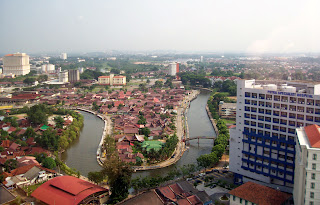I took plenty of bus rides during my time in China. Fortunately, most were uneventful. I don't have the horror stories of overcrowded overnight bus trips, or getting stuck in the mud like
Johnny Vagabond (whose post reminded me that I hadn't written this story yet). But, my first long-distance bus trip from Chengdu to Songpan was still an experience that I recall with a bit of humor, though it wasn't quite as amusing during the trip.
Jia decided that our best route to
Huanglong and Jiuzhaigou was to take a morning bus to Songpan, stay overnight, and head to Huanglong the following morning. During the May holiday, the buses were crowded and tickets were difficult to come by, but Jia managed to get us two tickets on what she claimed was a "second-class" bus.

It was rather hot for an early May morning--I was tempted to wear shorts, but I knew we'd be heading north into the mountains--and I was sweating by the time I got on the bus to find that it had no air conditioning. A breeze would've been nice through the open windows, but we sat in the parking lot for more than a half hour.
For the first few hours, I tried to sleep, but the old bus shook too much for me to get more than a few minutes of rest. I enjoyed the scenery through Sichuan and saw terraced fields along the river for the first time during my stay in China (but not the last time).
As we rolled down the road out of Chengdu with a fresh breeze, half the bus lit cigarettes to help them enjoy the ride. It wouldn't have been so bad had the passengers smoked a few cigarettes on the way, but they didn't. They decided to chain smoke during the entire 11-hour ride. This included the driver who sat below the "No Smoking" sign. At least the windows were open.
The open windows became a mixed blessing as we drove into the mountains. Snow was still on the ground, and a few flakes fell along the ride. The windows would not close--they were stuck. I packed my jacket in my backpack, so I had some warmth, though I had to share it with Jia because she didn't have one.
On this trip I discovered the secret to making money as a bus driver or ticket-taker in China--pick up hitchhikers. During the first three hours, we stopped to pick up another 10 passengers along the road. The driver and ticket-taker split the cash and most of the new passengers had to sit in the aisle. As we came to a checkpoint, the passengers in aisle were told to lie down so the police wouldn't see them. We passed through the checkpoint without incident and the passengers resumed sitting on their bags.
As this was a second-class bus, there was no toilet on board (I was spoiled by the nice buses with toilets and movies on the short trips to Guangzhou) and we had to stop a few times in villages--usually when someone requested that the driver stop. I avoided using the public toilets as long as I could. On the first two stops I browsed through the local shops that sold snacks and cheap souvenirs--Jia and I bought some dried fruit for the ride. By the third stop, I gave in. I paid my 5 jiao to use the toilet housed in a wooden shack. It was dirty and dark, and the floorboards creaked. The toilet was little more than a slat removed from the floor. I looked down at the hole and peered clear down the mountainside. I laughed as I thought I paid for what I could've done outside off the edge of the cliff.
We arrived in Songpan in the early evening. We bought our tickets for the earliest bus the next day and inquired about hotels--we were pointed to one right across the street. We wandered the town and hiked up part of a mountain before dark. We slept early in our hotel that had no heat and boarded a much nicer bus in the morning that took us to Huanglong.
 My first New Year holiday in China was spent in Guangzhou. Jia and I had been dating less than month and decided to take two days outside Shenzhen. Seeing as I only knew a handful of words in Chinese, Jia was my tour guide. She took me through the main sites--the Tomb of the Nanyue King, Guangxiao Temple, Chen's Folk Art Museum (where I purchased a miniature Statue of Liberty because it seemed so out of place), and Xiu Park.
My first New Year holiday in China was spent in Guangzhou. Jia and I had been dating less than month and decided to take two days outside Shenzhen. Seeing as I only knew a handful of words in Chinese, Jia was my tour guide. She took me through the main sites--the Tomb of the Nanyue King, Guangxiao Temple, Chen's Folk Art Museum (where I purchased a miniature Statue of Liberty because it seemed so out of place), and Xiu Park.



































